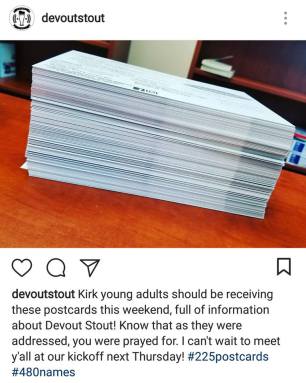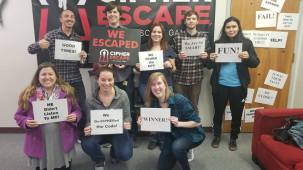Hitting a moving target

By Rev. Jordan B. Davis (M.Div.‘14)
Congregational Corner
“This is the first time I have been to a church that actually has something for young adults!”
I wish I was surprised by this comment. I wish I wasn’t as relieved as I was when I heard it.
I currently serve as “transitional associate pastor for youth and young adults” with an incredibly vibrant congregation. We have roughly 1,100 members and an active mission field larger than most I have seen (I even wrote about it as a church relations officer in 2015!). The youth program draws 50-60 individuals, grades 6-12, every Sunday between Sunday school and youth group. There are multiple levels of leadership for the youth and someone is always waiting to help in some way. This is a dream call, really.
Very early in this call, however, I noticed something missing. It seemed like everyone I talked to was beyond excited about everything I just mentioned… but never mentioned young adults. I remember asking the personnel committee, after a wonderful conversation about the youth ministry, “but what about the young adults?”
The response was silence, followed by a brief description of a monthly lunch and things that had been tried in the past. I felt a sense of lost hope and my heart broke. It was no different than almost any other church I visited as a church relations officer though, so I wasn’t completely surprised.
Young Adults (sorry, I refuse to call this group “millennials”) are a moving target of sorts. Not only are there so many life situations within this single group (college, graduated, single, married without kids, married with kids, divorced… the list is infinite), this is a group that is constantly on the move and trying to figure out how to make life work. This is a group regularly receiving prescriptions from those who are more experienced and know better; this is a group striving to be the ones who know better. Sometimes this group wants to dig in and have a deep theological discussion, and sometimes it is a group who just needs some fellowship after a long day of work. This group may not be able to show up on Sunday morning because of work, personal exhaustion, or nap time – and they need for others to be ok with that.
 As I prepared to start this transitional call, I started asking my friends what they needed. I asked those who are not in church on Sunday. I asked those who somehow managed to go to church more often than I did. I asked those who hate God, and those who are examples for the best of us in how to share God’s Word. I filled trash can after trash can with rough plans, schedules, and descriptions. I sent vision statements and logos (designed by a young adult I already knew!) to people and asked them a simple question, “Would you come?” I dreamed about gatherings – literally. I collected business cards at every “cool” place my husband and I visited. When the time came, I sent out an invitation via snail mail and all over social media, and prayed really hard.
As I prepared to start this transitional call, I started asking my friends what they needed. I asked those who are not in church on Sunday. I asked those who somehow managed to go to church more often than I did. I asked those who hate God, and those who are examples for the best of us in how to share God’s Word. I filled trash can after trash can with rough plans, schedules, and descriptions. I sent vision statements and logos (designed by a young adult I already knew!) to people and asked them a simple question, “Would you come?” I dreamed about gatherings – literally. I collected business cards at every “cool” place my husband and I visited. When the time came, I sent out an invitation via snail mail and all over social media, and prayed really hard.
When our group met for the first time, five of us sat around a table big enough for thirty at a local brewery. I left feeling like I had lost and cried over the phone to my husband, wondering what the effort had been for? I knew of at least fifteen who said they wanted to come.

A few weeks later, we had a different mix of five at a soccer game – I bought tailgate food for ten. With the encouragement of the husband who crossed out and reworded hundreds of schedules and statements with me, I kept sharing the upcoming events. We had seven, three, ten… fourteen. We continued to gather at the brewery, read and discussed a few books, assembled blessing bags for those experiencing homelessness, and managed to escape “Baker Street” in just under an hour. I cried on the way home in December when I realized we had reached my goal of fifteen. A casual conversation and many inquiring individuals along the way was the start of a Wednesday morning coffee group for parents of young children that has become a place where, at the very least, eight moms are guaranteed caffeine and adult conversation. Every gathering acting as one in a series – a set number before we can “give up” and say it didn’t work.
Yesterday, I had the opportunity finally to sit in on our brand new Sunday school class – another six-week “experiment.” I looked around at eleven faces in addition to the three who saw the need and committed to help teach on a rotation. Following worship, five of us gathered for another book discussion and lunch.
We broke thirty individuals who have been involved in some way.
Young adult ministry might be the hardest out there, and that is why it can be so hard to find. It would be so much easier to call it a bust than give up another evening in hopes that someone, anyone, will show up. It would be so much easier to celebrate the few in the pews than to reach out to those who are not and schedule another coffee or dinner meeting in hopes of finally getting face-to-face with someone. It would be so much easier to provide pastoral care as needed and focus on the other part of the common title “associate pastor for youth and young adults.”
Ministry isn’t supposed to be easy, though. And being a young adult is even harder (Yes, I said it!).
If you are in a congregation trying to figure out just what to do with our crazy age group, I encourage you not to give up. I encourage you to keep trying, to constantly reach out and ask young adults instead of assuming; to take advantage of the times when only one or two show up, giving thanks for those hard to find opportunities, and try again for the larger group.
Believe me – I have shed more than my fair share of tears as I try to figure this out. However, persistence has led to a five-member leadership team to share the planning and fatigue with. A five-member leadership team who feel called to help to make this group succeed, so that there is a place for them to safely laugh and collapse as they navigate this crazy season of adulthood.
How does your congregation minister to young adults?
What struggles have you found along the way?
What are your celebrations?
Alumna Jordan B. Davis is transitional associate pastor at Kirk of Kildaire Presbyterian Church in Cary, North Carolina, and editor of Congregational Corner.

